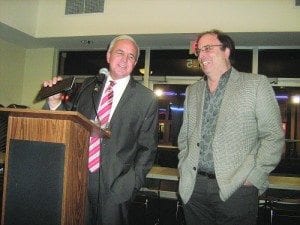
Legalizing Uber vehicles and adapting “technological advances” to improve a 30-year-old traffic signal system were the most specific answers provided by Miami-Dade Mayor Carlos Gimenez to help solve the county’s mounting traffic problems.
In a preview of his annual “State of the County” address, Gimenez appeared before an audience of more than 100 during a Kendall Federation of Homeowner Associations town meeting on Jan. 11, capsulizing his administration’s progress and answering residents’ questions.
His full speech is scheduled before Miami-Dade County Commissioners on Wednesday, Jan. 2, at 10 a.m.
Twice during a 90-minute session the mayor pitched his draft proposal that would mandate “e-hailing” apps for taxis, broadly rewriting existing county law to legalize Uber and similar app-based ride services. As the meeting closed, Miami-Dade Transit director Alice Bravo also urged adoption as a matter of public safety.
“We are also looking at updating an outdated 1986 system for signalization and synchronization of traffic lights throughout Miami-Dade to optimize travel on our roadways,” Gimenez added without citing any specific change other than “we’ve been doing this for the last two to three years.”
Gimenez also pledged “moving ahead with managed bus lanes, new bus shelters and creating new parking sites” to alleviate commuter traffic tieups.
The most fractious moments of the evening occurred midway during the Q&A session when Sharon Shaw, a dedicated Pets Trust supporter, challenged Gimenez to obey a “people’s demand that you honor the referendum vote” passed by 65 percent of the voters in November 2012 to raise $20 million for elimination of the euthanization of strays.
“You, Michael Rosenberg, will you run for mayor against someone who won’t listen to us?” demanded Shaw as the off-microphone KFHA president, an originator of Pets Trust, shook his head with an embarrassed grin, declining comment.
Gimenez, in an attempt to reduce tensions, maintained, “We have listened to Pets Trust people, many times. We hear you. We agree on what to do, only not the way to do it.”
He then called on Animal Services director Alex Munoz who pointed out that during Gimenez’s five years in office, elimination of euthanization at county pet shelters rose from 61 to 90 percent of strays housed.
In other items, the mayor:
• Will write a letter to support Kendale Lakes residents petitioning the U.S. Bureau of Indian Affairs to hold a public meeting to voice concerns of a proposed Miccosukee tribal land trust at its Golf and Country Club, as requested by KFHA’s Miles Moss.
• Was non-committal about the extent of 125 new police officers to be assigned following February Police Academy graduation to bulwark the West (formerly Hammocks) District force for added security in West Kendall while indicating the area was due to replace previous reductions.
• Declared the Nov. 3 appointment of James F. Murley as Chief Resilience Officer to monitor climate change and sea level demonstrates a focus on environmental issues, noting “we are one of the few cities in the U.S. to have a staff member, solely employed for this purpose.”
• Once again promised RollBackTolls leader Carlos Garcia that he is
totally against increasing Sunpass toll rates realizing profit making, noting “we continue to be diligent seeing that MDX operates solely on the basis of paying off indebtedness, operations and maintenance” for Miami-Dade expressways.
• Indicated that the county will continue to explore ways to resolve the dispute between FIU and Youth Fair concerning relocation, noting “the estimate to move the fair at $100 million without consideration for land acquisition continues to keep our hands tied.”
• Upheld the county’s role in “aiding the assemblage of properties” for the planned northwest Miami-Dade “Mega Mall,” adding that “in the ongoing process, many public hearings will allow voicing your concerns about it.”
An ability to budget “for the second year in a row” without raising taxes should continue for fiscal 2016-17 as well as the current budget year, Gimenez concluded.
“In many ways, we will continue to diversify our economy, the key to making Miami become one of the ‘Great Cities’ of the 21st Century,” he said.






